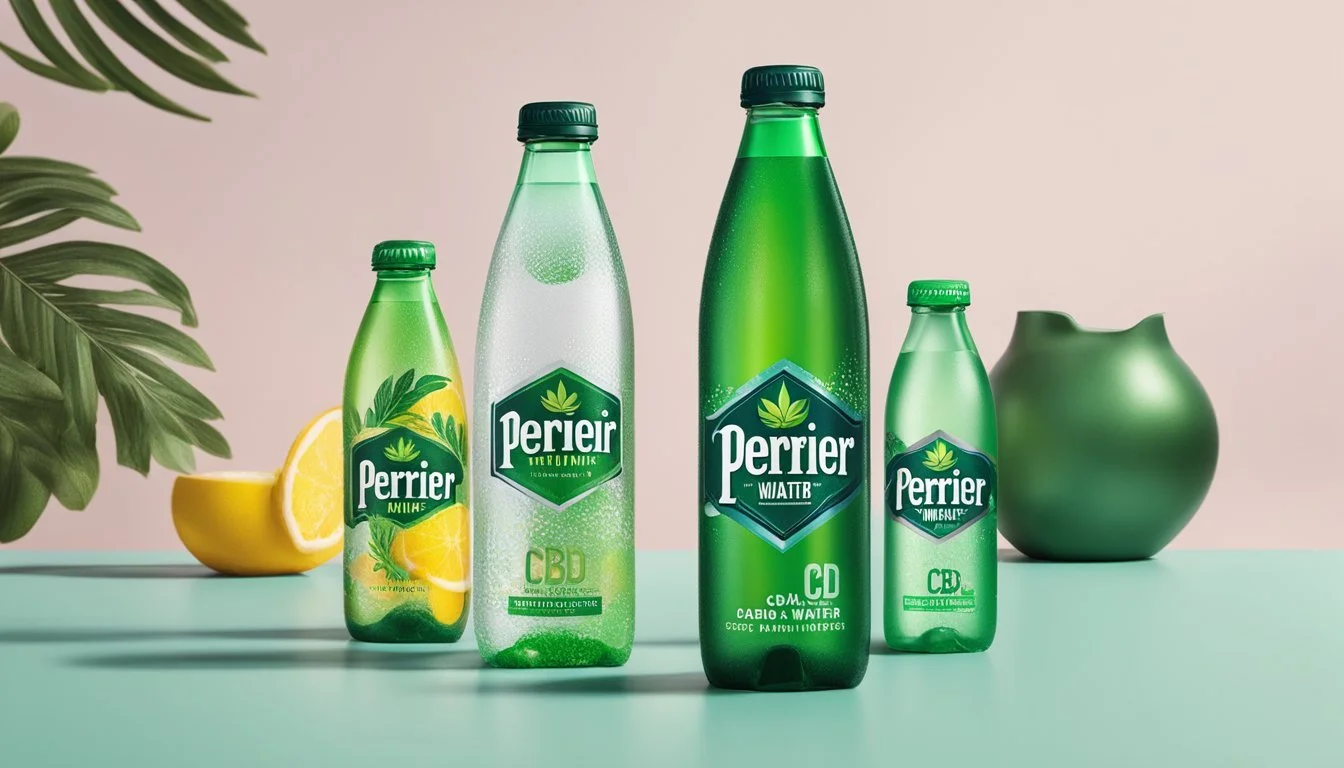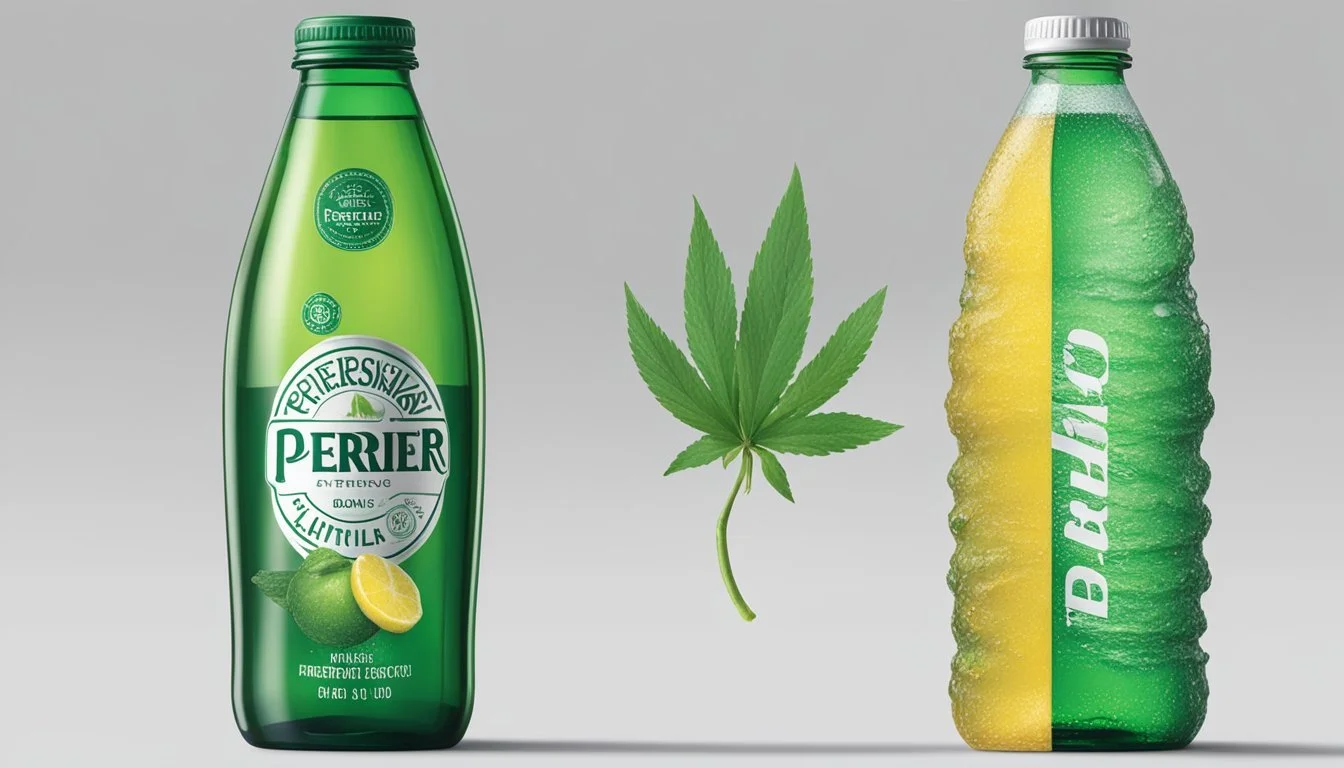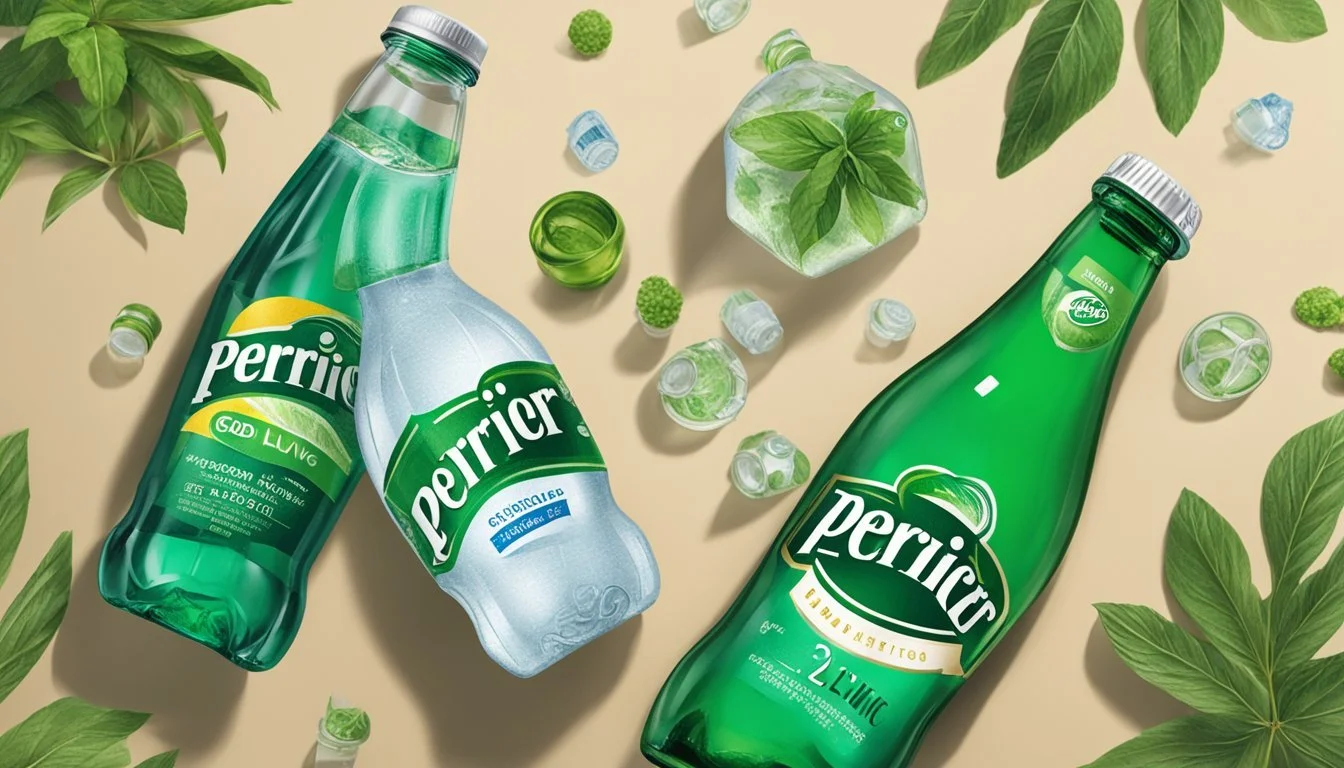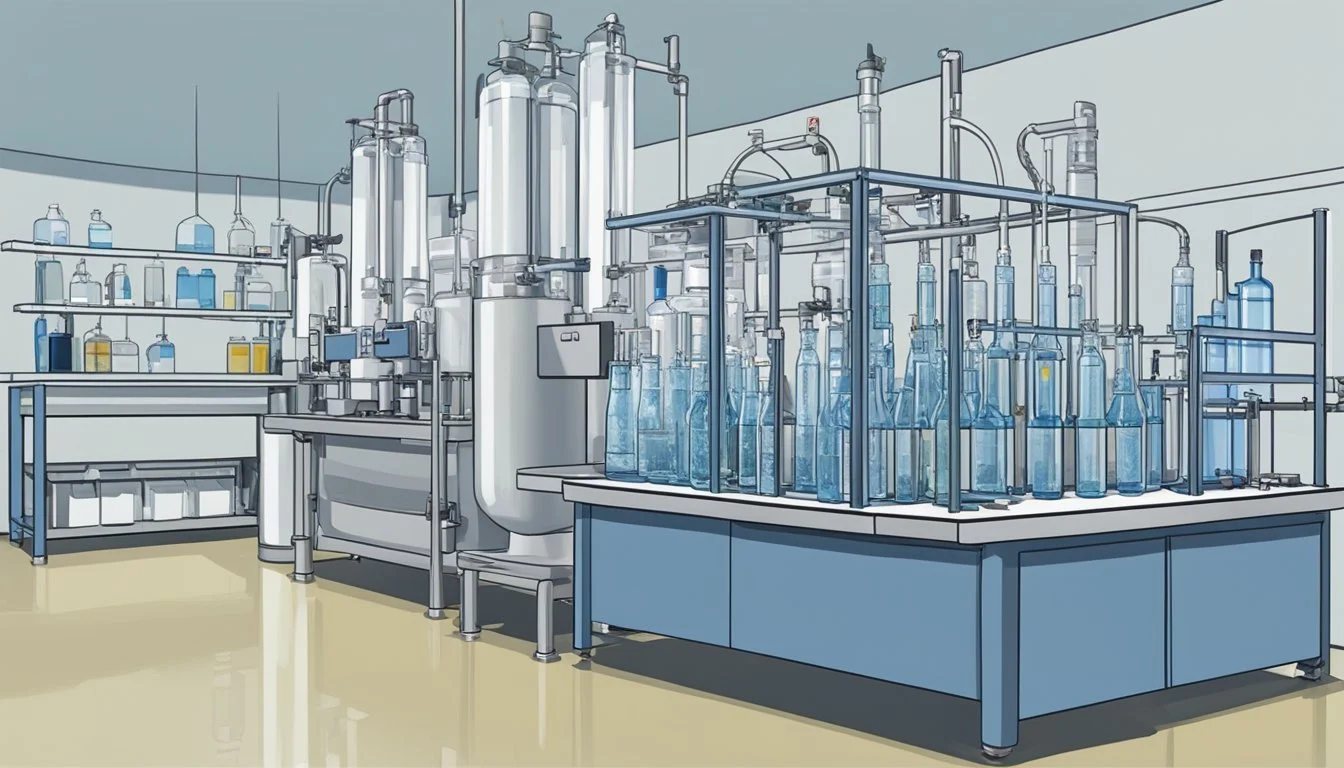Perrier vs. CBD Living
Which Bottled Water is Better for You?
When it comes to choosing the best bottled water, the debate between Perrier and CBD Living Water is quite intriguing. Perrier, known for its classic sparkling mineral water, boasts a rich history and a refreshing taste that has made it a household name worldwide. Its carbonation provides a unique and enjoyable drinking experience, essential for those who prefer a bit of fizz in their daily hydration.
On the other hand, CBD Living Water offers a modern twist by infusing water with cannabidiol (CBD). This innovative approach not only provides hydration but also delivers potential benefits associated with CBD, such as reduced anxiety and improved overall wellness. Priced at around $3.99 per bottle, it aims at a niche market looking for more than just hydration.
For those seeking a traditional, sparkling water experience, Perrier remains a top choice, whereas CBD Living Water caters to consumers interested in the added benefits of CBD. Understanding the distinct advantages of each can help you decide which bottled water aligns best with your lifestyle and preferences.
Understanding Bottled Water
Bottled water has become a staple in many households. Whether it's for convenience, taste, or perceived health benefits, the market offers a wide variety of options.
Mineral water typically comes from natural springs and contains minerals like calcium and magnesium. Perrier, sourced from Vergèze, France, is a well-known example. Its natural carbonation is a notable feature.
Spring water, also from natural springs, is collected at the source. It may or may not have the same mineral content as mineral water.
Purified water undergoes processing to remove impurities. Methods include distillation, deionization, and reverse osmosis. This type of water is often free from contaminants and might lack minerals present in spring or mineral water.
Consumers often compare brands for their sourcing methods. For instance, Perrier's natural carbonation contrasts with other brands that add carbonation artificially.
CBD Living Water is infused with cannabidiol, an active ingredient derived from the cannabis plant. This type of water caters to those seeking potential health benefits from CBD. It is important to note that this water type is significantly different from traditional mineral or spring waters.
Type Source Key Features Perrier Natural spring (Vergèze) Naturally carbonated, contains minerals CBD Living Purified water Infused with cannabidiol Spring Water Natural springs Varies in mineral content Purified Water Various sources Free from contaminants, lacks minerals
This variety allows consumers to choose based on their preferences and health needs.
The Origins of Perrier and CBD Living Water
Perrier and CBD Living Water both have distinct origins that contribute to their unique identities. Perrier's history is rooted in the natural spring water of the south of France, while CBD Living Water emerged from innovative approaches to hydration and wellness.
Perrier: A Story of Sparkling Success
Perrier’s journey began in the south of France, near the town of Vergèze. Discovered in the 19th century, this natural spring water quickly gained recognition for its therapeutic qualities.
Dr. Louis Perrier, the spa's medical director, identified its potential and aimed to commercialize it. Financial constraints led to the sale of the spring to Sir John Harmsworth in 1903. Harmsworth rebranded the water, and Perrier became synonymous with premium carbonated mineral water.
The brand's iconic green bottle and effervescent quality have made it a staple worldwide. Perrier’s success lies in its dedication to bottling natural, carbonated spring water that is both refreshing and health-promoting.
CBD Living: Innovation in Hydration
CBD Living Water was created in 2014, representing a modern take on hydration. This product blends natural spring water with cannabidiol (CBD) extracted from hemp. The addition of 10 mg of nano-CBD per bottle sets it apart from traditional bottled waters.
CBD Living’s innovation lies in its use of nanotechnology to increase CBD bioavailability. This allows for quicker absorption and potential anti-inflammatory benefits. The water is also alkaline with a pH of 9+, which aims to balance the body's acidity.
CBD Living Water caters to health-conscious consumers looking for additional wellness benefits from their hydration sources.
Chemical and Mineral Composition
Exploring the chemical and mineral compositions of Perrier and CBD Living Water reveals key differences in their nutritional profiles and benefits. This examination focuses on their mineral content, electrolyte levels, and the presence of cannabidiol in CBD Living Water.
Breaking Down the Mineral Content
Perrier:
Perrier is known for its naturally occurring minerals, notably calcium and magnesium. A typical composition includes:
Calcium: Approximately 160 mg/L
Magnesium: Around 6 mg/L
Sodium: 9 mg/L
Potassium: 1 mg/L
These minerals contribute to Perrier’s distinctive taste and slight minerality. The levels offer slight nutritional benefits.
CBD Living Water:
CBD Living Water might include various minerals dependent on its source and processing. However:
Minerals: Typically less focused on high mineral content
Cannabidiol: Infused with CBD, which is not a mineral but an active compound
The presence of CBD is unique to this water but does not replace traditional mineral benefits found in Perrier.
Assessing Electrolyte Levels
Perrier:
Sodium: 9 mg/L
Potassium: 1 mg/L
Magnesium: 6 mg/L
Calcium: 160 mg/L
These electrolyte levels, while not high, help in maintaining basic bodily functions. They are not necessarily sufficient for athletes or those needing high electrolyte replenishment.
CBD Living Water:
Generally targets hydration and CBD benefits rather than electrolyte enhancement. Any electrolytes present would likely be minimal, focusing more on the infusion of CBD for its purported health benefits.
The Presence of Cannabidiol in CBD Living Water
CBD Living Water:
Cannabidiol (CBD): Contains nano-CBD particles designed for enhanced absorption.
Concentration: Varies by brand; typically measured in milligrams per bottle.
CBD is noted for potential benefits such as reduced anxiety and improved sleep patterns. Its inclusion differentiates this water from traditional mineral waters like Perrier. Unlike Perrier’s focus on natural carbonation and mineral content, CBD Living Water’s unique selling point is its CBD infusion.
Combining traditional hydration benefits with cannabidiol offers a novel approach to bottled water.
Health and Nutritional Information
When comparing Perrier and CBD Living water, it's essential to focus on their nutritional content and how they stand up against tap water. This section covers vitamins, macronutrients, and the broader context of bottled water vs. tap water.
Vitamins and Macronutrients in Bottled Water
Most bottled waters, including Perrier and CBD Living, contain negligible amounts of vitamins and macronutrients. Perrier, being a carbonated mineral water, does not supply significant vitamins or macronutrients but is calorie-free.
Perrier Nutritional Information:
Calories: 0
Fat: 0g
Carbohydrates: 0g
Protein: 0g
CBD Living water may offer additional benefits due to the presence of cannabidiol (CBD), though its direct nutritional contributions are minimal. CBD is not recognized as a vitamin or a macronutrient, but it may provide other health benefits.
FDA and EPA Oversight:
Both types of bottled water fall under the regulatory oversight of the FDA, whereas tap water is regulated by the EPA. These regulations ensure that both bottled and tap water meet strict safety standards, though the nutrient profile remains low in both.
Comparing Bottled Water and Tap Water
In terms of hydration, both Perrier and CBD Living water serve their purpose effectively. They can be just as hydrating as plain tap water. Tap water often contains fluoride, which can be beneficial for dental health.
Tap Water Nutritional Information:
Calories: 0
Fat: 0g
Carbohydrates: 0g
Protein: 0g
Tap water may contain trace amounts of minerals such as calcium, magnesium, and potassium, depending on its source. These minerals can contribute slightly to daily dietary needs but are generally not sufficient to rely on for significant nutritional supplementation.
Daily Need Coverage Score:
Bottled waters typically do not score high in daily need coverage as they lack meaningful vitamin and macronutrient content. Tap water, while slightly varied in mineral content, also does not make a significant nutritional contribution.
In summary, neither Perrier nor CBD Living water provides substantial vitamins, macronutrients, or calories, paralleling the low nutrient profile of tap water. However, each serves well for hydration and may offer specific additional benefits like calorie-freeness and potential CBD effects.
Taste and Aesthetics
The taste and appearance of bottled water significantly influence consumer preferences. Perrier, known for its characteristic sparkling nature, contrasts sharply with CBD Living Water, a still water with added benefits.
Examining the Taste Profile of Perrier
Perrier, a sparkling mineral water, is well-regarded for its crisp and refreshing profile. The natural carbonation, which originates from the spring, gives it a unique effervescence that is both invigorating and palate-cleansing.
The minerals from the rock through which the water percolates contribute subtly to its taste. This combination of carbonation and minerals results in a beverage that feels light on the tongue yet has a distinctive mineral tang.
Perrier's taste can be particularly appealing to those who enjoy a fizzy drink without added sugars or sweeteners. It stands out among bottled waters due to these natural elements.
The Flavor of CBD Living Water
CBD Living Water offers a vastly different experience as it is a still water infused with CBD. Unlike Perrier, it has no carbonation, providing a smooth and calm drinking sensation.
The addition of CBD doesn't significantly alter the water's taste, ensuring it remains as pure and neutral as possible. This makes it an excellent option for those looking for hydration without any overwhelming flavors.
CBD Living Water also prides itself on being free from sugars, artificial sweeteners, and preservatives, appealing to health-conscious consumers. It is ideally suited for individuals interested in the potential therapeutic benefits of CBD without compromising on the familiar taste of still water.
Packaging and Environmental Impact
The choice of packaging materials and eco-friendly practices significantly affects the environmental impact of bottled water brands like Perrier and CBD Living. Understanding the implications is crucial for environmentally conscious consumers.
Bottle Materials: Glass vs. Plastic
Perrier primarily uses glass and PET plastic bottles for their carbonated mineral water. Glass is generally more eco-friendly as it is easily recyclable and does not leach chemicals. However, producing glass bottles requires significant energy and results in higher CO2 emissions.
CBD Living typically utilizes BPA-free plastic bottles which are more lightweight and cost-effective. Plastic is also easier to transport due to its weight, reducing transport-related emissions. Unfortunately, plastic has a lower recycling rate and contributes significantly to plastic pollution.
Eco-Friendly Practices and Sustainability
Perrier has implemented several sustainability initiatives, including reducing the weight of their PET bottles and increasing the use of recycled materials. They aim to achieve carbon neutrality in the near future, focusing on energy-efficient production methods and water sourcing practices that minimize environmental harm.
CBD Living also emphasizes sustainability, sourcing their water from California, where strict water management practices are in place. They focus on responsible water sourcing and filtration processes that ensure minimal environmental disruption. Additionally, their commitment to reducing single-use plastic ties into broader recycling initiatives.
While both brands show commitment to sustainability, the choice between glass and plastic plays a crucial role in their respective environmental impacts. Perrier’s use of recyclable glass contrasts with CBD Living’s focus on lightweight and BPA-free plastic.
Pricing and Availability
When it comes to choosing between Perrier and CBD Living, consumers often weigh the cost and ease of purchasing these water brands. A better understanding of their market prices and consumer accessibility will help make an informed decision.
Market Prices and Consumer Accessibility
Perrier, known for its sparkling mineral water, typically costs less than CBD Living, which is infused with cannabidiol. A bottle of Perrier generally ranges from $1 to $2, depending on the store and any ongoing promotions. CBD Living Water, on the other hand, has a price point closer to $3.99 per bottle according to recent reports.
Availability also plays a critical role. Perrier is widely available in grocery stores, convenience stores, and online retailers. It benefits from strong distribution channels, making it easy for consumers to find quickly. Conversely, while CBD Living Water is becoming more popular, it may not yet be as readily available in all locations.
Market trends indicate a growing interest in CBD-infused products, which could improve the availability of CBD Living. Perrier remains a staple in the sparkling water market due to its long-standing reputation and consistent quality. Consumers should consider both the price point and how easily they can purchase these products when making their choice.
Filtration and Purification Methods
Understanding the filtration and purification methods of both Perrier and CBD Living provides insights into the unique qualities and benefits of each brand's bottled water. Perrier utilizes natural mineral water sources and emphasizes natural purity, while CBD Living focuses on advanced purification technologies to offer clean and enhanced water.
Techniques Used in Perrier
Perrier's water is sourced from a natural spring in Vergèze, France. The mineral water undergoes a natural filtration process as it travels through layers of limestone, which lends Perrier its unique mineral content and taste. Since Perrier is a sparkling mineral water, it is renowned for its natural effervescence.
Once the water reaches the surface, it is captured and subjected to carbonation, ensuring the bubbles are consistent with each bottle. This careful handling highlights Perrier’s commitment to maintaining the water’s natural purity and effervescence through minimal interference.
The Process Behind CBD Living
CBD Living employs advanced purification methods to ensure the highest quality water. The process typically involves reverse osmosis, which removes impurities and dissolved solids to create ultra-pure water. Reverse osmosis is followed by nanoemulsion technology, which infuses the water with CBD, ensuring it is evenly dispersed and easily absorbable by the body.
The use of multiple filtration stages ensures that CBD Living water is free from contaminants, making it one of the cleanest bottled waters available. These steps guarantee a blend of pure hydration with the health benefits of CBD, catering to consumers seeking both purity and functional enhancements in their bottled water.
Regulatory and Quality Standards
Both Perrier and CBD Living adhere to stringent regulations and quality standards to ensure the safety and trust of their consumers. This section examines the global and national regulatory bodies that oversee these companies, as well as the certifications and compliance each brand maintains.
Global and National Regulatory Bodies
Perrier, known for its mineral water, must meet international standards set by bodies like the World Health Organization (WHO) and the International Bottled Water Association (IBWA). In the United States, the FDA regulates bottled water under Code of Federal Regulations (CFR) Title 21. This includes ensuring the water meets standards for contaminants such as chemicals and microbes. CBD Living, which infuses CBD into its water, must comply with the FDA and EPA regulations, particularly on CBD-infused products and water quality. They also must adhere to state-specific guidelines, which can be stricter than federal standards.
Comparing Certifications and Compliance
Perrier holds certifications like the NSF International certification and follows standards set by the FDA and IBWA. These certifications require regular testing for contaminants and adherence to Good Manufacturing Practices (GMP). CBD Living must ensure that its products are not only compliant with water quality standards but also meet regulations for CBD-infused products. They might obtain certifications such as ISO 22000 for food safety management and USDA Organic if applicable.
Brand Key Certifications Regulatory Bodies Perrier NSF International, IBWA Standards FDA, WHO, IBWA CBD Living ISO 22000, USDA Organic (if applicable) FDA, EPA, State Agencies
Both brands must consistently update and ensure compliance with these standards to maintain consumer trust and meet legal requirements. Non-compliance can result in regulatory actions and loss of consumer confidence.
Consumer Reviews and Reputation
This analysis focuses on how consumers perceive and review Perrier and CBD Living Water. Considering aspects like taste, brand reputation, and market presence provides insights into these two popular bottled water brands.
Public Perceptions of Perrier
Perrier enjoys a strong market presence and is widely recognized for its distinctive sparkling water. Consumers often highlight Perrier's crisp, refreshing taste and consistent carbonation as major positives. It is perceived as a premium brand, often associated with quality and sophistication.
Despite its reputation, some consumers note that Perrier’s price can be relatively high compared to other sparkling waters. Additionally, a few reviews mention that the distinctive mineral taste may not appeal to everyone. Regardless, its historic brand reputation and widespread availability contribute to its continued popularity.
Consumer Experiences with CBD Living Water
CBD Living Water is known for infusing water with cannabidiol (CBD), appealing to health and wellness enthusiasts. Reviews frequently compliment its innovative fusion of hydration and potential health benefits. The brand claims its water enhances relaxation and improves overall wellbeing.
Consumers appreciate the variety of flavors and the lack of artificial additives. CBD Living has built a reputable name in the wellness market, although some users report skepticism regarding the actual effectiveness of CBD in water form. Moreover, a segment of consumers finds the price point relatively high, reflecting the niche market it targets.
More About Perrier
Icelandic Glacial vs Perrier: Which Bottled Water is Better?
Mountain Valley Spring Water vs Perrier: Which Bottled Water is Better?
Perrier vs Kirkland Signature: Which Bottled Water is Better?
Perrier vs Richard's Rainwater: Which Bottled Water is Better?
Perrier vs Whole Foods Italian Still Mineral water: Which Bottled Water is Better?
More About CBD Living
Aqua Carpatica vs CBD Living: Which Bottled Water is Better?
Cascade Mountain vs CBD Living: Which Bottled Water is Better?
Core Hydration vs CBD Living: Which Bottled Water is Better?
Crystal Geyser vs CBD Living: Which Bottled Water is Better?
Hawaii Volcanic vs CBD Living: Which Bottled Water is Better?
Hawaiian Springs vs CBD Living: Which Bottled Water is Better?
Icelandic Glacial vs CBD Living: Which Bottled Water is Better?
Kirkland Signature vs CBD Living: Which Bottled Water is Better?
Mountain Valley Spring Water vs CBD Living: Which Bottled Water is Better?
Nestle Pure Life vs CBD Living: Which Bottled Water is Better?
Richard's Rainwater vs CBD Living: Which Bottled Water is Better?
San Pellegrino vs CBD Living: Which Bottled Water is Better?
Solan de Cabras vs CBD Living: Which Bottled Water is Better?
Talking Rain AQA vs CBD Living: Which Bottled Water is Better?
Whole Foods 365 vs CBD Living: Which Bottled Water is Better?
Whole Foods Italian Still Mineral water vs CBD Living: Which Bottled Water is Better?








